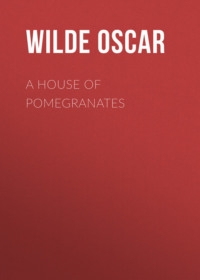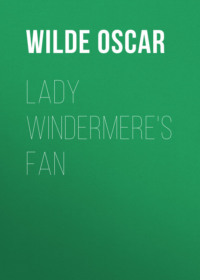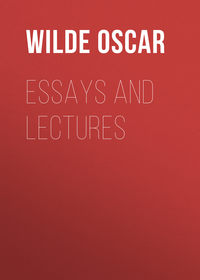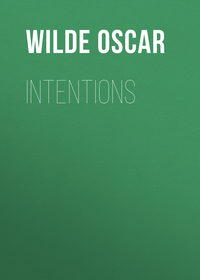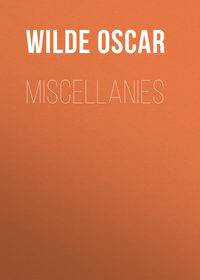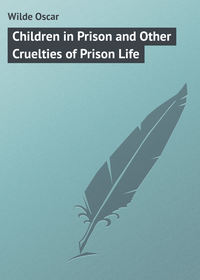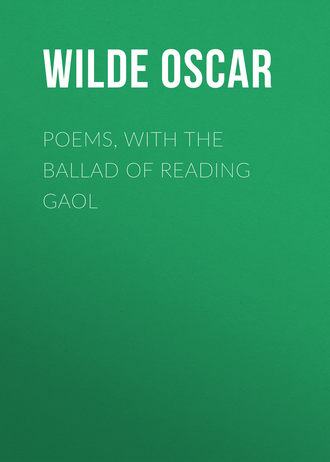 полная версия
полная версияPoems, with The Ballad of Reading Gaol

Oscar Wilde
Poems, with The Ballad of Reading Gaol
This collection of Wilde’s Poems contains the volume of 1881 in its entirety, ‘The Sphinx’, ‘The Ballad of Reading Gaol,’ and ‘Ravenna.’ Of the Uncollected Poems published in the Uniform Edition of 1908, a few, including the Translations from the Greek and the Polish, are omitted. Two new poems, ‘Désespoir’ and ‘Pan,’ which I have recently discovered in manuscript, are now printed for the first time. Particulars as to the original publication of each poem will be found in ‘A Bibliography of the Poems of Oscar Wilde,’ by Stuart Mason, London 1907.
Robert Ross.POEMS
HÉLAS!
To drift with every passion till my soulIs a stringed lute on which all winds can play,Is it for this that I have given awayMine ancient wisdom, and austere control?Methinks my life is a twice-written scrollScrawled over on some boyish holidayWith idle songs for pipe and virelay,Which do but mar the secret of the whole.Surely there was a time I might have trodThe sunlit heights, and from life’s dissonanceStruck one clear chord to reach the ears of God:Is that time dead? lo! with a little rodI did but touch the honey of romance—And must I lose a soul’s inheritance?ELEUTHERIA
SONNET TO LIBERTY
Not that I love thy children, whose dull eyesSee nothing save their own unlovely woe,Whose minds know nothing, nothing care to know, —But that the roar of thy Democracies,Thy reigns of Terror, thy great Anarchies,Mirror my wildest passions like the seaAnd give my rage a brother – ! Liberty!For this sake only do thy dissonant criesDelight my discreet soul, else might all kingsBy bloody knout or treacherous cannonadesRob nations of their rights inviolateAnd I remain unmoved – and yet, and yet,These Christs that die upon the barricades,God knows it I am with them, in some things.AVE IMPERATRIX
Set in this stormy Northern sea, Queen of these restless fields of tide,England! what shall men say of thee, Before whose feet the worlds divide?The earth, a brittle globe of glass, Lies in the hollow of thy hand,And through its heart of crystal pass, Like shadows through a twilight land,The spears of crimson-suited war, The long white-crested waves of fight,And all the deadly fires which are The torches of the lords of Night.The yellow leopards, strained and lean, The treacherous Russian knows so well,With gaping blackened jaws are seen Leap through the hail of screaming shell.The strong sea-lion of England’s wars Hath left his sapphire cave of sea,To battle with the storm that mars The stars of England’s chivalry.The brazen-throated clarion blows Across the Pathan’s reedy fen,And the high steeps of Indian snows Shake to the tread of armèd men.And many an Afghan chief, who lies Beneath his cool pomegranate-trees,Clutches his sword in fierce surmise When on the mountain-side he seesThe fleet-foot Marri scout, who comes To tell how he hath heard afarThe measured roll of English drums Beat at the gates of Kandahar.For southern wind and east wind meet Where, girt and crowned by sword and fire,England with bare and bloody feet Climbs the steep road of wide empire.O lonely Himalayan height, Grey pillar of the Indian sky,Where saw’st thou last in clanging flight Our wingèd dogs of Victory?The almond-groves of Samarcand, Bokhara, where red lilies blow,And Oxus, by whose yellow sand The grave white-turbaned merchants go:And on from thence to Ispahan, The gilded garden of the sun,Whence the long dusty caravan Brings cedar wood and vermilion;And that dread city of Cabool Set at the mountain’s scarpèd feet,Whose marble tanks are ever full With water for the noonday heat:Where through the narrow straight Bazaar A little maid CircassianIs led, a present from the Czar Unto some old and bearded khan, —Here have our wild war-eagles flown, And flapped wide wings in fiery fight;But the sad dove, that sits alone In England – she hath no delight.In vain the laughing girl will lean To greet her love with love-lit eyes:Down in some treacherous black ravine, Clutching his flag, the dead boy lies.And many a moon and sun will see The lingering wistful children waitTo climb upon their father’s knee; And in each house made desolatePale women who have lost their lord Will kiss the relics of the slain —Some tarnished epaulette – some sword — Poor toys to soothe such anguished pain.For not in quiet English fields Are these, our brothers, lain to rest,Where we might deck their broken shields With all the flowers the dead love best.For some are by the Delhi walls, And many in the Afghan land,And many where the Ganges falls Through seven mouths of shifting sand.And some in Russian waters lie, And others in the seas which areThe portals to the East, or by The wind-swept heights of Trafalgar.O wandering graves! O restless sleep! O silence of the sunless day!O still ravine! O stormy deep! Give up your prey! Give up your prey!And thou whose wounds are never healed, Whose weary race is never won,O Cromwell’s England! must thou yield For every inch of ground a son?Go! crown with thorns thy gold-crowned head, Change thy glad song to song of pain;Wind and wild wave have got thy dead, And will not yield them back again.Wave and wild wind and foreign shore Possess the flower of English land —Lips that thy lips shall kiss no more, Hands that shall never clasp thy hand.What profit now that we have bound The whole round world with nets of gold,If hidden in our heart is found The care that groweth never old?What profit that our galleys ride, Pine-forest-like, on every main?Ruin and wreck are at our side, Grim warders of the House of Pain.Where are the brave, the strong, the fleet? Where is our English chivalry?Wild grasses are their burial-sheet, And sobbing waves their threnody.O loved ones lying far away, What word of love can dead lips send!O wasted dust! O senseless clay! Is this the end! is this the end!Peace, peace! we wrong the noble dead To vex their solemn slumber so;Though childless, and with thorn-crowned head, Up the steep road must England go,Yet when this fiery web is spun, Her watchmen shall descry from farThe young Republic like a sun Rise from these crimson seas of war.TO MILTON
Milton! I think thy spirit hath passed awayFrom these white cliffs and high-embattled towers; This gorgeous fiery-coloured world of oursSeems fallen into ashes dull and grey,And the age changed unto a mimic play Wherein we waste our else too-crowded hours: For all our pomp and pageantry and powersWe are but fit to delve the common clay,Seeing this little isle on which we stand, This England, this sea-lion of the sea, By ignorant demagogues is held in fee,Who love her not: Dear God! is this the land Which bare a triple empire in her hand When Cromwell spake the word Democracy!LOUIS NAPOLEON
Eagle of Austerlitz! where were thy wings When far away upon a barbarous strand, In fight unequal, by an obscure hand,Fell the last scion of thy brood of Kings!Poor boy! thou shalt not flaunt thy cloak of red, Or ride in state through Paris in the van Of thy returning legions, but insteadThy mother France, free and republican,Shall on thy dead and crownless forehead place The better laurels of a soldier’s crown, That not dishonoured should thy soul go downTo tell the mighty Sire of thy raceThat France hath kissed the mouth of Liberty, And found it sweeter than his honied bees, And that the giant wave DemocracyBreaks on the shores where Kings lay couched at ease.SONNET
ON THE MASSACRE OF THE CHRISTIANS IN BULGARIAChrist, dost Thou live indeed? or are Thy bonesStill straitened in their rock-hewn sepulchre?And was Thy Rising only dreamed by herWhose love of Thee for all her sin atones?For here the air is horrid with men’s groans,The priests who call upon Thy name are slain,Dost Thou not hear the bitter wail of painFrom those whose children lie upon the stones?Come down, O Son of God! incestuous gloomCurtains the land, and through the starless nightOver Thy Cross a Crescent moon I see!If Thou in very truth didst burst the tombCome down, O Son of Man! and show Thy mightLest Mahomet be crowned instead of Thee!QUANTUM MUTATA
There was a time in Europe long ago When no man died for freedom anywhere, But England’s lion leaping from its lairLaid hands on the oppressor! it was soWhile England could a great Republic show. Witness the men of Piedmont, chiefest care Of Cromwell, when with impotent despairThe Pontiff in his painted porticoTrembled before our stern ambassadors. How comes it then that from such high estate We have thus fallen, save that LuxuryWith barren merchandise piles up the gateWhere noble thoughts and deeds should enter by: Else might we still be Milton’s heritors.LIBERTATIS SACRA FAMES
Albeit nurtured in democracy, And liking best that state republican Where every man is Kinglike and no manIs crowned above his fellows, yet I see,Spite of this modern fret for Liberty, Better the rule of One, whom all obey, Than to let clamorous demagogues betrayOur freedom with the kiss of anarchy.Wherefore I love them not whose hands profane Plant the red flag upon the piled-up street For no right cause, beneath whose ignorant reignArts, Culture, Reverence, Honour, all things fade, Save Treason and the dagger of her trade, Or Murder with his silent bloody feet.THEORETIKOS
This mighty empire hath but feet of clay: Of all its ancient chivalry and might Our little island is forsaken quite:Some enemy hath stolen its crown of bay,And from its hills that voice hath passed away Which spake of Freedom: O come out of it, Come out of it, my Soul, thou art not fitFor this vile traffic-house, where day by day Wisdom and reverence are sold at mart, And the rude people rage with ignorant criesAgainst an heritage of centuries. It mars my calm: wherefore in dreams of Art And loftiest culture I would stand apart,Neither for God, nor for his enemies.THE GARDEN OF EROS
It is full summer now, the heart of June; Not yet the sunburnt reapers are astirUpon the upland meadow where too soon Rich autumn time, the season’s usurer,Will lend his hoarded gold to all the trees,And see his treasure scattered by the wild and spendthrift breeze.Too soon indeed! yet here the daffodil, That love-child of the Spring, has lingered onTo vex the rose with jealousy, and still The harebell spreads her azure pavilion,And like a strayed and wandering revellerAbandoned of its brothers, whom long since June’s messengerThe missel-thrush has frighted from the glade, One pale narcissus loiters fearfullyClose to a shadowy nook, where half afraid Of their own loveliness some violets lieThat will not look the gold sun in the faceFor fear of too much splendour, – ah! methinks it is a placeWhich should be trodden by Persephone When wearied of the flowerless fields of Dis!Or danced on by the lads of Arcady! The hidden secret of eternal blissKnown to the Grecian here a man might find,Ah! you and I may find it now if Love and Sleep be kind.There are the flowers which mourning Herakles Strewed on the tomb of Hylas, columbine,Its white doves all a-flutter where the breeze Kissed them too harshly, the small celandine,That yellow-kirtled chorister of eve,And lilac lady’s-smock, – but let them bloom alone, and leaveYon spirèd hollyhock red-crocketed To sway its silent chimes, else must the bee,Its little bellringer, go seek instead Some other pleasaunce; the anemoneThat weeps at daybreak, like a silly girlBefore her love, and hardly lets the butterflies unfurlTheir painted wings beside it, – bid it pine In pale virginity; the winter snowWill suit it better than those lips of thine Whose fires would but scorch it, rather goAnd pluck that amorous flower which blooms alone,Fed by the pander wind with dust of kisses not its own.The trumpet-mouths of red convolvulus So dear to maidens, creamy meadow-sweetWhiter than Juno’s throat and odorous As all Arabia, hyacinths the feetOf Huntress Dian would be loth to marFor any dappled fawn, – pluck these, and those fond flowers which areFairer than what Queen Venus trod upon Beneath the pines of Ida, eucharis,That morning star which does not dread the sun, And budding marjoram which but to kissWould sweeten Cytheræa’s lips and makeAdonis jealous, – these for thy head, – and for thy girdle takeYon curving spray of purple clematis Whose gorgeous dye outflames the Tyrian King,And foxgloves with their nodding chalices, But that one narciss which the startled SpringLet from her kirtle fall when first she heardIn her own woods the wild tempestuous song of summer’s bird,Ah! leave it for a subtle memory Of those sweet tremulous days of rain and sun,When April laughed between her tears to see The early primrose with shy footsteps runFrom the gnarled oak-tree roots till all the wold,Spite of its brown and trampled leaves, grew bright with shimmering gold.Nay, pluck it too, it is not half so sweet As thou thyself, my soul’s idolatry!And when thou art a-wearied at thy feet Shall oxlips weave their brightest tapestry,For thee the woodbine shall forget its prideAnd veil its tangled whorls, and thou shalt walk on daisies pied.And I will cut a reed by yonder spring And make the wood-gods jealous, and old PanWonder what young intruder dares to sing In these still haunts, where never foot of manShould tread at evening, lest he chance to spyThe marble limbs of Artemis and all her company.And I will tell thee why the jacinth wears Such dread embroidery of dolorous moan,And why the hapless nightingale forbears To sing her song at noon, but weeps aloneWhen the fleet swallow sleeps, and rich men feast,And why the laurel trembles when she sees the lightening east.And I will sing how sad Proserpina Unto a grave and gloomy Lord was wed,And lure the silver-breasted Helena Back from the lotus meadows of the dead,So shalt thou see that awful lovelinessFor which two mighty Hosts met fearfully in war’s abyss!And then I’ll pipe to thee that Grecian tale How Cynthia loves the lad Endymion,And hidden in a grey and misty veil Hies to the cliffs of Latmos once the SunLeaps from his ocean bed in fruitless chaseOf those pale flying feet which fade away in his embrace.And if my flute can breathe sweet melody, We may behold Her face who long agoDwelt among men by the Ægean sea, And whose sad house with pillaged porticoAnd friezeless wall and columns toppled downLooms o’er the ruins of that fair and violet cinctured town.Spirit of Beauty! tarry still awhile, They are not dead, thine ancient votaries;Some few there are to whom thy radiant smile Is better than a thousand victories,Though all the nobly slain of WaterlooRise up in wrath against them! tarry still, there are a fewWho for thy sake would give their manlihood And consecrate their being; I at leastHave done so, made thy lips my daily food, And in thy temples found a goodlier feastThan this starved age can give me, spite of allIts new-found creeds so sceptical and so dogmatical.Here not Cephissos, not Ilissos flows, The woods of white Colonos are not here,On our bleak hills the olive never blows, No simple priest conducts his lowing steerUp the steep marble way, nor through the townDo laughing maidens bear to thee the crocus-flowered gown.Yet tarry! for the boy who loved thee best, Whose very name should be a memoryTo make thee linger, sleeps in silent rest Beneath the Roman walls, and melodyStill mourns her sweetest lyre; none can playThe lute of Adonais: with his lips Song passed away.Nay, when Keats died the Muses still had left One silver voice to sing his threnody,But ah! too soon of it we were bereft When on that riven night and stormy seaPanthea claimed her singer as her own,And slew the mouth that praised her; since which time we walk alone,Save for that fiery heart, that morning star Of re-arisen England, whose clear eyeSaw from our tottering throne and waste of war The grand Greek limbs of young DemocracyRise mightily like Hesperus and bringThe great Republic! him at least thy love hath taught to sing,And he hath been with thee at Thessaly, And seen white Atalanta fleet of footIn passionless and fierce virginity Hunting the tuskèd boar, his honied luteHath pierced the cavern of the hollow hill,And Venus laughs to know one knee will bow before her still.And he hath kissed the lips of Proserpine, And sung the Galilæan’s requiem,That wounded forehead dashed with blood and wine He hath discrowned, the Ancient Gods in himHave found their last, most ardent worshipper,And the new Sign grows grey and dim before its conqueror.Spirit of Beauty! tarry with us still, It is not quenched the torch of poesy,The star that shook above the Eastern hill Holds unassailed its argent armouryFrom all the gathering gloom and fretful fight —O tarry with us still! for through the long and common night,Morris, our sweet and simple Chaucer’s child, Dear heritor of Spenser’s tuneful reed,With soft and sylvan pipe has oft beguiled The weary soul of man in troublous need,And from the far and flowerless fields of iceHas brought fair flowers to make an earthly paradise.We know them all, Gudrun the strong men’s bride, Aslaug and Olafson we know them all,How giant Grettir fought and Sigurd died, And what enchantment held the king in thrallWhen lonely Brynhild wrestled with the powersThat war against all passion, ah! how oft through summer hours,Long listless summer hours when the noon Being enamoured of a damask roseForgets to journey westward, till the moon The pale usurper of its tribute growsFrom a thin sickle to a silver shieldAnd chides its loitering car – how oft, in some cool grassy fieldFar from the cricket-ground and noisy eight, At Bagley, where the rustling bluebells comeAlmost before the blackbird finds a mate And overstay the swallow, and the humOf many murmuring bees flits through the leaves,Have I lain poring on the dreamy tales his fancy weaves,And through their unreal woes and mimic pain Wept for myself, and so was purified,And in their simple mirth grew glad again; For as I sailed upon that pictured tideThe strength and splendour of the storm was mineWithout the storm’s red ruin, for the singer is divine;The little laugh of water falling down Is not so musical, the clammy goldClose hoarded in the tiny waxen town Has less of sweetness in it, and the oldHalf-withered reeds that waved in ArcadyTouched by his lips break forth again to fresher harmony.Spirit of Beauty, tarry yet awhile! Although the cheating merchants of the martWith iron roads profane our lovely isle, And break on whirling wheels the limbs of Art,Ay! though the crowded factories begetThe blindworm Ignorance that slays the soul, O tarry yet!For One at least there is, – He bears his name From Dante and the seraph Gabriel, —Whose double laurels burn with deathless flame To light thine altar; He too loves thee well,Who saw old Merlin lured in Vivien’s snare,And the white feet of angels coming down the golden stair,Loves thee so well, that all the World for him A gorgeous-coloured vestiture must wear,And Sorrow take a purple diadem, Or else be no more Sorrow, and DespairGild its own thorns, and Pain, like Adon, beEven in anguish beautiful; – such is the emperyWhich Painters hold, and such the heritage This gentle solemn Spirit doth possess,Being a better mirror of his age In all his pity, love, and weariness,Than those who can but copy common things,And leave the Soul unpainted with its mighty questionings.But they are few, and all romance has flown, And men can prophesy about the sun,And lecture on his arrows – how, alone, Through a waste void the soulless atoms run,How from each tree its weeping nymph has fled,And that no more ’mid English reeds a Naiad shows her head.Methinks these new Actæons boast too soon That they have spied on beauty; what if weHave analysed the rainbow, robbed the moon Of her most ancient, chastest mystery,Shall I, the last Endymion, lose all hopeBecause rude eyes peer at my mistress through a telescope!What profit if this scientific age Burst through our gates with all its retinueOf modern miracles! Can it assuage One lover’s breaking heart? what can it doTo make one life more beautiful, one dayMore godlike in its period? but now the Age of ClayReturns in horrid cycle, and the earth Hath borne again a noisy progenyOf ignorant Titans, whose ungodly birth Hurls them against the august hierarchyWhich sat upon Olympus; to the DustThey have appealed, and to that barren arbiter they mustRepair for judgment; let them, if they can, From Natural Warfare and insensate Chance,Create the new Ideal rule for man! Methinks that was not my inheritance;For I was nurtured otherwise, my soulPasses from higher heights of life to a more supreme goal.Lo! while we spake the earth did turn away Her visage from the God, and Hecate’s boatRose silver-laden, till the jealous day Blew all its torches out: I did not noteThe waning hours, to young EndymionsTime’s palsied fingers count in vain his rosary of suns!Mark how the yellow iris wearily Leans back its throat, as though it would be kissedBy its false chamberer, the dragon-fly, Who, like a blue vein on a girl’s white wrist,Sleeps on that snowy primrose of the night,Which ’gins to flush with crimson shame, and die beneath the light.Come let us go, against the pallid shield Of the wan sky the almond blossoms gleam,The corncrake nested in the unmown field Answers its mate, across the misty streamOn fitful wing the startled curlews fly,And in his sedgy bed the lark, for joy that Day is nigh,Scatters the pearlèd dew from off the grass, In tremulous ecstasy to greet the sun,Who soon in gilded panoply will pass Forth from yon orange-curtained pavilionHung in the burning east: see, the red rimO’ertops the expectant hills! it is the God! for love of himAlready the shrill lark is out of sight, Flooding with waves of song this silent dell, —Ah! there is something more in that bird’s flight Than could be tested in a crucible! —But the air freshens, let us go, why soonThe woodmen will be here; how we have lived this night of June!ROSA MYSTICA
REQUIESCAT
Tread lightly, she is near Under the snow,Speak gently, she can hear The daisies grow.All her bright golden hair Tarnished with rust,She that was young and fair Fallen to dust.Lily-like, white as snow, She hardly knewShe was a woman, so Sweetly she grew.Coffin-board, heavy stone, Lie on her breast,I vex my heart alone, She is at rest.Peace, Peace, she cannot hear Lyre or sonnet,All my life’s buried here, Heap earth upon it.Avignon.SONNET ON APPROACHING ITALY
I reached the Alps: the soul within me burned, Italia, my Italia, at thy name: And when from out the mountain’s heart I cameAnd saw the land for which my life had yearned,I laughed as one who some great prize had earned: And musing on the marvel of thy fame I watched the day, till marked with wounds of flameThe turquoise sky to burnished gold was turned.The pine-trees waved as waves a woman’s hair, And in the orchards every twining spray Was breaking into flakes of blossoming foam:But when I knew that far away at Rome In evil bonds a second Peter lay, I wept to see the land so very fair.Turin.SAN MINIATO
See, I have climbed the mountain side Up to this holy house of God, Where once that Angel-Painter trodWho saw the heavens opened wide, And throned upon the crescent moon The Virginal white Queen of Grace, — Mary! could I but see thy faceDeath could not come at all too soon. O crowned by God with thorns and pain! Mother of Christ! O mystic wife! My heart is weary of this lifeAnd over-sad to sing again. O crowned by God with love and flame! O crowned by Christ the Holy One! O listen ere the searching sunShow to the world my sin and shame.

